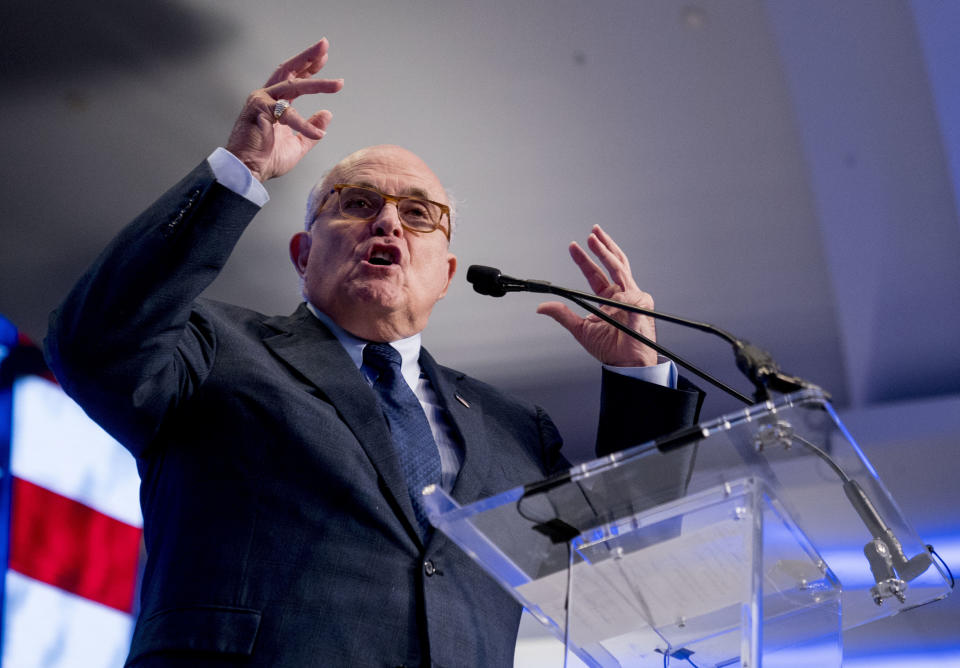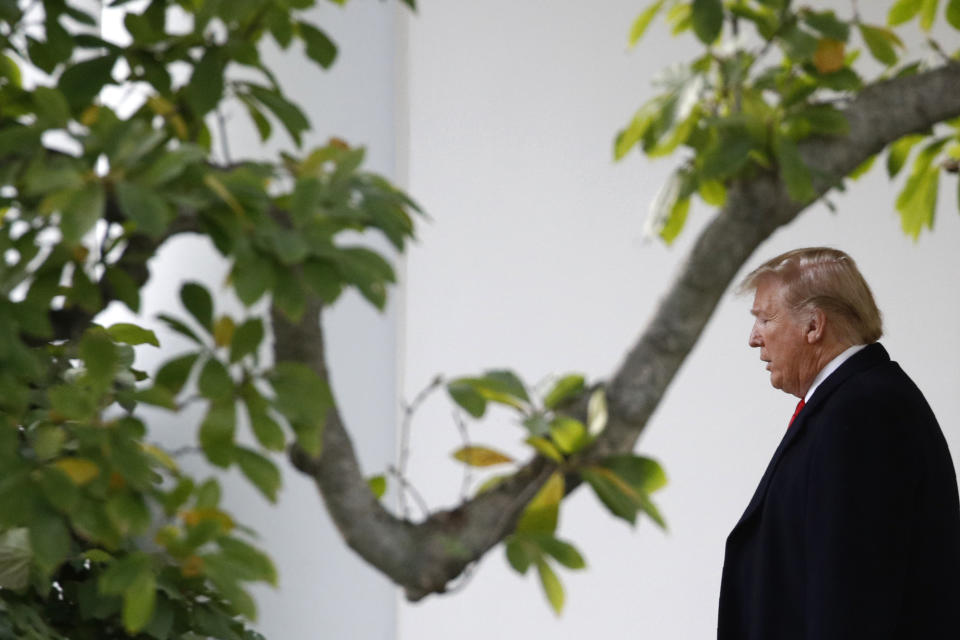'Insidious': New impeachment probe testimony backs up quid pro quo allegations
WASHINGTON — Newly released testimony by key witnesses in the impeachment probe includes a revised statement by Gordon Sondland, U.S. ambassador to the European Union, acknowledging that he “spoke individually” with a top Ukrainian official about what President Trump needed to see from Kiev before releasing military and other aid already approved by Congress.
Sondland also described the pressure on U.S. diplomats in Ukraine as “insidious.”
The release comes as, for a second day, Republicans got what they had asked for, with Democrats making public the testimony of key witnesses in the impeachment inquiry now being conducted by the House of Representatives into Trump’s alleged political interference in relations with Ukraine. And for a second day, the testimony made public only added to the growing body of evidence against the president.
Also made public on Tuesday was the interview with Kurt Volker, the former special envoy to Ukraine. At one point in his testimony, which was heard last month out of public view by a panel of three House committees, Volker said it was “extremely unfortunate” that U.S. foreign policy had been subordinated to Trump’s political aims.
“This becomes explosive in our domestic politics,” Volker said of attempting to enlist Ukraine to harm Trump’s political adversaries.
According to a whistleblower complaint filed with the inspector general of the intelligence community, Trump tried to pressure new Ukrainian President Volodymyr Zelensky into opening an investigation into Hunter Biden, the son of Democratic presidential contender Joe Biden. Hunter Biden was on the board of Burisma, a Ukrainian energy company that has faced credible allegations of malfeasance. The older Biden was vice president of the United States at the time that Hunter was made a Burisma board member.
In releasing the testimony of Volker and Sondland, House Democrats were responding to Republican accusations that the impeachment inquiry was unduly secretive. But in having at least partly assuaged the GOP’s complaints about the impeachment process, Democrats have only complicated attempts by the president’s supporters to argue that the contents of that inquiry are without merit.
![Gordon Sondland, Kurt Volker and President Trump. (Photo illustration: Yahoo News; photos: AP [3], J. Scott Applewhite/AP)](https://s.yimg.com/ny/api/res/1.2/APvyq1x26pDj_aT_xWIL6g--/YXBwaWQ9aGlnaGxhbmRlcjt3PTk2MDtoPTUxNw--/https://media-mbst-pub-ue1.s3.amazonaws.com/creatr-uploaded-images/2019-11/2642eff0-000c-11ea-afff-b17a652f6631)
If anything, the testimony made public over the last two days — Monday saw the release of testimony transcripts from former U.S. Ambassador to Ukraine Marie Yovanovitch and former high-ranking State Department official Michael McKinley — seems to show that Trump did attempt to tie some $400 million in foreign aid to Zelensky’s agreeing to open an investigation into Biden. Such an arrangement, Democrats maintain, is an impeachable offense. They opened a formal impeachment inquiry into Trump last week.
A statement by leading congressional Democrats called the newly released documents part of a “damning evidentiary record.” Although the public phase of the impeachment inquiry is only beginning, articles of impeachment could be filed by the Democratic-controlled House before the end of the year.
Sondland, who testified before the impeachment panel on Oct. 17, had previously been seen as the most Trump-friendly witness, having been a longtime Republican donor in the Pacific Northwest, where he is a hotelier. But in a revised opening statement, Sondland made clear that Trump was tethering U.S. foreign policy — that is, support of a critical Eastern European ally that had been a victim of Russian aggression — to a willingness to damage the Bidens with charges of corruption.
In his revised statement, Sondland said that since his initial impeachment interview, he had been able to recall a conversation with Andriy Yermak, a top aide to Zelensky, that took place on Sept. 1 in the Polish capital, Warsaw. In the course of that conversation, Sondland’s revised statement reads, “I said that resumption of U.S. aid would likely not occur until Ukraine provided the public anti-corruption statement that we had been discussing for many weeks.”
The president’s personal lawyer Rudy Giuliani had been pushing for Zelensky to make such a statement for much of the summer. Like the president, Giuliani has claimed that Ukraine interfered in the 2016 presidential election on Hillary Clinton’s behalf and, in addition, that Hunter Biden had been awarded the Burisma seat only because of his father’s obviously influential position in the Obama administration.
The newly released documents seem to also complicate the role of Volker, a respected public servant who nevertheless found himself as a go-between for Giuliani and Ukrainian officials. On July 10, Volker met with Yermak at the Trump International Hotel in Washington, D.C., for breakfast. Before the beginning of that meal, Volker texted Giuliani, telling him that “we have an opportunity to get you what you need.”

That opportunity would be the statement Zelensky was to make about a corruption investigation. On Aug. 12, Yermak sent Volker a proposed statement that would have Zelensky announce an investigation into “the problem of interference in the political processes of the United States.” The following day, in a text exchange with Yermak that also included Sondland, Volker sent revisions to that statement that included a clause about “Burisma and the 2016 U.S. elections.” The inclusion of this detail was critical for Trump — and his lawyer Giuliani.
Despite the efforts by Giuliani and others, Zelensky never made the corruption statement Trump sought. And though the White House attempted to withhold military and other aid to Ukraine, it was pressured to release the funds by Congress in September.
In his testimony, Volker made clear that although he tried to help Giuliani, he did not agree with Giuliani’s assessment of the situation in Ukraine. Volker told investigators that Joe Biden was “a person of integrity” and that it was “not credible” that he was somehow facilitating any allegedly corrupt behavior by his son. At the same time, Volker did acknowledge it was “entirely plausible” that Ukraine could have attempted to influence the 2016 election. No credible evidence of such influence has been uncovered.
Volker testified that while he did not support the notion of including the Burisma clause, he did want the Ukrainians to say something about corruption. “I believed that would be helpful in overcoming this deep skepticism that the president had about Ukraine,” Volker said. He thought that if Zelensky could “just insert Burisma and 2016,” Trump might be mollified and soften his approach to Ukraine, which badly needed U.S. aid to fend off Russia, which was backing separatists in the east.
Volker said that once he grasped that Giuliani was acting without the sanction of the U.S. foreign policy establishment, he advised Yermak not to make the statement he had himself helped amend to include Burisma. “Avoid anything that would look like it would play into our domestic politics,” Volker remembers telling Yermak in agreeing with him that an anti-corruption statement from Zelensky would be improper.
Bill Taylor, who replaced Yovanovitch as the top U.S. diplomat in Kiev, said in his testimony that Giuliani was part of an “irregular, informal” channel that conducted U.S. foreign policy outside the bounds of diplomatic propriety.
Use of that channel was encouraged by Trump, who allegedly told both Volker and Sondland to “talk to Rudy” in dealing with Ukraine. But in his testimony, Sondland described how when he asked Secretary of State Mike Pompeo about Giuliani’s role, Pompeo “rolled his eyes” in response.
“Yes, it’s something we have to deal with,” Pompeo told Sondland.

In her own testimony, Yovanovitch seemed to suggest that the State Department did not do enough to defend her from suggestions by Giuliani and other Trump allies (including the president’s son Donald Jr.) that she was working at cross-purposes with Trump. Yovanovitch was dismissed in May and was disappointed to find that the State Department declined to offer a statement of support for the work she had been doing in Ukraine.
That official silence could be seen as a tacit endorsement of Giuliani’s activities by Pompeo, a close Trump ally who is believed to be pondering a run for the U.S. Senate.
Sondland described how Giuliani increased pressure throughout the spring and summer of 2019 for an explicitly political anti-corruption message from Zelensky. “This whole thing was sort of a continuum,” Sondland said in the testimony released on Tuesday. He added that “negotiations” over a Zelensky statement on investigating the Bidens and the 2016 election “kept getting more insidious as the timeline went on.”
In previous discussions with Yahoo News, staffers for Republican members of Congress had suggested that Trump would be vindicated by Volker’s testimony when it was finally made public. But evidence of that vindication appeared to be in short supply, with the career diplomat trying to balance long-held foreign policy imperatives with Trump’s desires to have the Ukrainians do his political bidding.
As for the testimony of Sondland, its utility to Trump has all but vanished.
Congressional investigators asked him if he thought Giuliani’s purported efforts to have Ukraine investigate the Bidens — which the ambassador had already agreed was “problematic” — were also “illegal.”
“I’m not a lawyer,” Sondland replied, “but I assume so.”
Additional reporting by Dylan Stableford
_____
Download the Yahoo News app to customize your experience.
Read more from Yahoo News:



